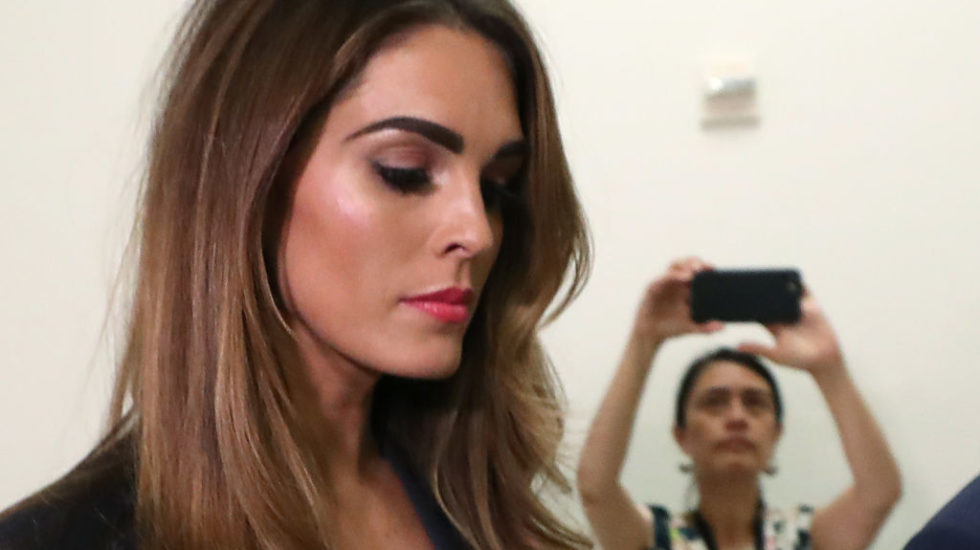On June 18, White House counsel Pat Cipollone told Congress that former presidential aide Hope Hicks was “absolutely immune” from testifying about her work for Trump at the White House.
Laurence Tribe, pre-eminent constitutional scholar and Harvard law professor, found the claim “laughable”:
Preet Bharara, former US Attorney for the Southern District of New York, likewise ridiculed it:
On June 19, White House lawyers showed up at Hicks’ closed interview and asserted Cipollone’s objection. She followed their instruction and refused to answer — 155 times. Afterward, House Judiciary Committee member Rep. Ted Lieu (D-CA) said,
“We’re watching obstruction of justice in action.”
Here’s an example of what Lieu was talking about:
“Q: In the White House, where is your office located?”
“White House Lawyer: We’ll object to that.” (Tr. p. 86)
Transparency and television coverage are not Trump’s friends — or Cipollone’s — or Hicks’s. Mueller’s report and the Trump-Russia Timeline reveal why Trump is blocking testimony and resisting public hearings.
Trump-Russia Campaign Contacts
On Nov. 10, 2016 — two days after the election — Russia’s Deputy Foreign Minister Sergei Ryabkov said that the Kremlin maintained contact with Trump’s “immediate entourage” throughout the campaign. The same day, Vladimir Putin’s personal spokesman, Dmitry Peskov, said Russian experts were in contact with some members of Trump’s staff during the campaign.
Immediately, Hicks contradicted them:
“We are not aware of any campaign representatives that were in touch with any foreign entities before yesterday, when Mr. Trump spoke with many world leaders.” She then denied any contacts between the campaign and Russia: “It never happened. There was no communication between the campaign and any foreign entity during the campaign.” [Mueller Report, Vol. II, p. 21]
That wasn’t true. More than 75 pages of Mueller’s report outline “Russian Government Links To And Contacts With The Trump Campaign.” The more than 120 contacts included Jared Kushner, Paul Manafort, Donald Trump Jr., Michael Cohen, Jeff Sessions, George Papadopoulos, and Carter Page. (Vol. I, pp. 66-144; Tr. p. 153)
Obstruction
Hicks’ name appeared in Mueller’s report more than 180 times. At key moments in Trump’s effort to obstruct justice, she was there. Hicks has already told Mueller about them, but televised hearings would shine a public spotlight on the episodes.
- Trump fury over Sessions’ recusal and Mueller’s appointment
MARCH 5, 2017: After Attorney General Jeff Sessions recused himself from the Russia investigation, Hicks witnessed Trump’s anger (although she’s not clear on the dates). (Vol. II, p. 51, fn. 304) When Trump learned about Mueller’s appointment on May 17, she saw his ire again — only worse. (Vol. II, p. 79)
- Trump fired James Comey
MAY 6-7, 2017: Trump tried to cover-up his motives for firing FBI Director James Comey, but then told Russia’s foreign minister and ambassador his real reason: to remove the pressure of the Russia investigation. Hicks witnessed key moments in the episode. (Vol. II, p. 71, fn. 470)
- Trump lied about the Trump Tower Meeting
JULY 8-9, 2017: The New York Times was breaking an explosive story: Jared Kushner, Paul Manafort, and Donald Trump Jr. had met on June 9, 2016, with Russians promising “dirt” on Hillary Clinton.” Trump personally formulated his son’s false statement to the press. Hicks was at the center of the action. (Vol. II, pp. 100-104)
- Trump tried to limit Mueller’s investigation
JULY 19, 2017: Trump dictated a message that he wanted Corey Lewandowski to give then-Attorney General Jeff Sessions. He proposed a public statement limiting Mueller’s investigation to future elections only. Hicks typed it up for Lewandowski. (Vol. II, pp. 91-94, fn. 625)
- Trump pressured McGahn to lie for him
JAN. 26, 2018: Trump wanted then-White House counsel Don McGahn to lie about The New York Times’ breaking story that Trump had ordered McGahn to fire Mueller. McGahn refused. Hicks was in the loop. (Vol. II, p. 114)
When House Judiciary committee members directed Hicks to pages in Mueller’s report relating to those episodes, White House lawyers objected, and she refused to answer questions about them. (Tr. pp. 202-207)
End Game
The Republican National Committee is paying Hicks’ legal fees. (Tr. pp. 225-226) Since leaving the White House, she has spoken to Trump “somewhere between 5 and 10 times,” most recently in April. (Tr. p. 126)
The White House’s objection does not prevent Hicks from answering Congress’ questions. That’s her decision, but it’s now become her problem. Because if the courts reject the “congressional immunity” objection, her continued silence will lead to contempt penalties that she alone will bear — not Trump, Cipollone, or the RNC. At that point, she’ll face another decision.
This is the latest in a series of posts by Steven J. Harper on the Mueller report. Steve is the creator and curator of the Trump-Russia Timeline appearing at Dan Rather’s News & Guts and at Just Security. He’s an attorney, adjunct professor at Northwestern University Law School, and author of four books, including Crossing Hoffa — A Teamster’s Story (Chicago Tribune “Best Book of the Year”) and The Lawyer Bubble — A Profession in Crisis. He blogs at The Belly of the Beast. Follow him on Twitter (@StevenJHarper1).
